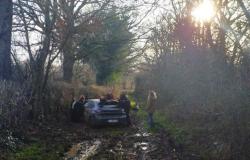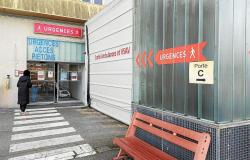The two States will have waited thirteen years before joining the 23 EU countries already members and fully benefiting from the area of free movement.
After 13 years in the Schengen antechamber, Romania and Bulgaria on Wednesday fully accessed the area of free movement, on the road and in the air, a strong symbol for the two Eastern European countries. Already one foot in the zone with the lifting of controls in March 2024 in airports and seaports, they received the approval of their European partners in mid-December to benefit from the same privileges at land border posts. Ceremonies were organized at different crossing points to celebrate the changeover at midnight local time (10 p.m. GMT).
It is “greatest success” of 2024, greeted Romanian Prime Minister Marcel Ciolacu in his wishes. And the end of a long wait for the two former communist countries, among the poorest in the EU. They have met the technical criteria since 2011 but “each time, Member States raised objections”recalls analyst Valentin Naumescu. This problem has become over the years “a source of frustration exploited by anti-EU parties denouncing unfair treatment of Romania”he told AFP, as during the recent presidential election which saw the emergence of a surprise far-right candidate before being canceled. With the accession to Schengen, “this feeling of being second-class citizens” is fading, estimates the expert. On both sides, leaders saluted for a moment “historical”emphasizing that it was a “key objective” “since their entry into the EU” in 2007.
Created in 1985, the Schengen area now includes 25 of the 27 EU member countries as well as their associated neighbors Switzerland, Norway, Iceland and Liechtenstein. More than 400 million people can in principle travel without being subject to checks. This full membership of Romania (19 million inhabitants) and Bulgaria (6.5 million) was made possible by the lifting of Austria's veto. Refractory since 2022, Vienna finally accepted partial entry from Sofia and Bucharest last spring and established a road map for possible expansion. The Alpine country deplored an influx of asylum seekers which would worsen in the event of a land enlargement of Schengen, but it believes that the measures put in place in recent months have made it possible “a massive reduction in passages”.
Good news for the economy
According to an agreement presented in November, temporary controls will be carried out “for an initial period of six months, in order to minimize the potential change in migratory routes”. Surveillance of the Bulgarian-Turkish border, which becomes the external border of the Schengen area, will also be reinforced. Significant economic benefits are expected, likely to boost gross domestic product (GDP) by at least 1% in both countries, according to estimates. Road hauliers, tired of waiting sometimes for almost 20 hours, are rubbing their hands. “It was a complete waste of time for the drivers who couldn't even rest because they had to move their vehicles every 10 minutes”relates Beniamin Lucescu, president of a Transport Federation in Romania.
In Bulgaria, the poor state of infrastructure should, however, limit the positive impact: narrow roads, motorways often poorly maintained, few bridges over the Danube demarcating the border with Romania, non-existent or dilapidated railways… On the tourism side, the Industry players are banking on an increase in the number of travelers going to neighboring Greece. “This is excellent news”rejoices Ivaïlo Kirkov, 46-year-old sales manager, owner of a house in the north of the country. “We were looking forward to full membership of Schengen”. For Gueorgui Grantcharov, guide and Greek teacher, there is no doubt that both Romanians and Bulgarians will now favor Greece as a destination. Without queues, “it takes a little over four hours to get from Sofia to Thessaloniki, it's as quick as going to the Bulgarian Black Sea coast”.






